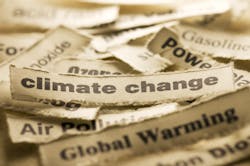We're at a critical juncture for the future of our planet. Climate change is happening, and unless we all take collective action in the coming days, months and years, there will be severe consequences for subsequent generations of people and animals.
The world is changing, and we as a country and global citizenry will have to respond accordingly. Many of these initiatives and directives will fall under the purview EHS and ESG departments at organizations.
We share these stories you may have missed, because they may become part of your workload in the future (if they aren’t already).
A Landmark Human Right
Today, Oct. 8, the U.N. Human Rights Council recognized—for the first time—that having a clean, healthy and sustainable environment is a human right.
“The Human Rights Council’s decisive action in recognizing the human right to a clean, healthy and sustainable environment is about protecting people and planet – the air we breathe, the water we drink, the food we eat. It is also about protecting the natural systems which are basic preconditions to the lives and livelihoods of all people, wherever they live,” said Michelle Bachelet, UN High Commissioner for Human Rights. “Having long called for such a step, I am gratified that the Council’s action today clearly recognizes environmental degradation and climate change as interconnected human rights crises.”
This resolution acknowledges the damage climate change and environmental destruction that has been inflicted on millions of people around the globe—and that the most vulnerable segments of the population are most impacted. It will now go to the UN General Assembly for further consideration.
The World Health Organization estimates about 13.7 million deaths a year, about 24% of all global deaths, are due to environmental risks such as air pollution and chemical exposure.
The Council’s resolution is not legally binding but does have the potential to affect the law. Reuters reports that lawyers say it could help build arguments in cases involving the environment and human rights.
The Council also voted to create a new special rapporteur focused on the human rights impacts of climate change.
Read the announcement here.
Extended Producer Responsibility
For years, we have been rinsing out our milk jugs and tossing them in the blue bin. We didn’t think much more of recycling beyond wheeling our can to the curb.
Then, in 2018, we learned that China, which was buying most of the United States’ recyclables, banned the import of many recyclable materials. That left municipalities scrambling. Some raised taxes to cover the increased costs, some limited the materials they accepted and some stopped collecting recycling altogether.
Now, Maine has passed a law for extended producer responsibility, whereby companies are required to help fund recycling by contributing to a fund that reimburses municipalities. The law won’t go into full effect until 2027, giving lawmakers and companies time to sort through the details.
Maine is one of the first states in the U.S. to adopt extended producer responsibility, a practice that has long been used by Japan, South Korea, much of the European Union and parts of Canada.
Time will tell if other states adopt similar legislation.
Still, the calls to address climate change are growing louder in recent years. There’s been increased interest in sustainability and responsibly sourced materials, including use of refillable or compostable packaging. More than 150 multinational companies have signed a pledge to address packaging waste, including Coca Cola, Nestle and Unilever.
Read the full story here.
Dangers Posed by Climate Change
It can be difficult for us to process information about the future or to wrap our head around large numbers, especially in reports.
This new, notably short reports from the White House is different. Top officials at every government agency have considered the most pressing climate threat and postulate how cope with them.
These 2021 Federal Climate Adaption Plans offer blunt descriptions of the dangers climate change pose, including protecting workers against extreme heat, preventing supply chain disruptions and using less energy and water in existing buildings—things safety professionals are already aware of.
The New York Times did a recap of six ways American life could be impacted.
“Nearly every service that the government provides will be impacted by climate change sooner or later,” said Jesse Keenan, a professor at Tulane University who has advised federal agencies on climate adaption, to The New York Times.
Read each agency’s Federal Climate Adaptation Plans here.
Rating Your Stress
It feels like every day, week and month has been stressful for one reason or another. LinkedIn sought to quantify that. In the latest edition of LinkedIn’s Workforce Confidence survey, it found that of the nearly 20,000 people surveyed in across nearly two dozen industries in the past three months, those in the arts reported the highest work-related stress levels (84%), followed by healthcare (75%) and education (73%).
While those fields may have more visible stress—crowded ICUs, the switch to remote learning and shutdowns that greatly affected their income—no one will come out of the COVID-19 pandemic unscathed.
Work-related stress was reported by 65% of those in manufacturing, 64% of those in construction and 63% of those in energy and mining, the lowest category.
It’s yet another reminder that these are trying times for everyone, so it’s important to show ourselves and one another some kindness.
View the full results here.
About the Author
Nicole Stempak
Nicole Stempak is managing editor of EHS Today and conference content manager of the Safety Leadership Conference.

